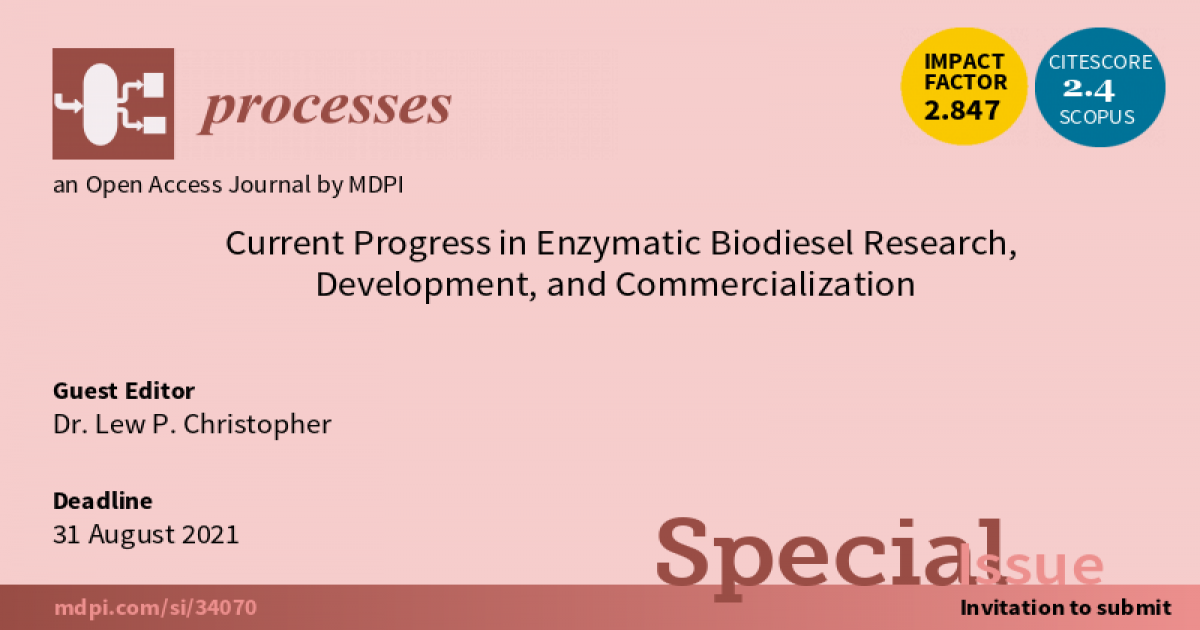Current Progress in Enzymatic Biodiesel Research, Development, and Commercialization
A special issue of Processes (ISSN 2227-9717). This special issue belongs to the section "Biological Processes and Systems".
Deadline for manuscript submissions: closed (31 August 2021) | Viewed by 21330

Special Issue Editor
Interests: enzymatic biodiesel; enzymatic catalysis; lipase; transesterification; triglycerides; waste oils; microbial lipids; glycerol; production; scale-up; commercialization; challenges
Special Issue Information
Dear Colleagues,
Biodiesel is viewed as a renewable, biodegradable, nontoxic, and clean-burning alternative to fossil fuels, which can be used in existing engines and infrastructure with practically no changes. The greenhouse gas emissions from biodiesel are several times lower than gasoline and petrodiesel. The chemical-catalyzed transesterification of vegetable oils to biodiesel has been industrially adopted due to its high conversion rates and low production time. However, this process suffers from several inherent drawbacks related to energy-intensive and environmentally unfriendly processing steps, such as catalyst and product recovery, and wastewater treatment. This has prompted the development of enzymatic catalysis for biodiesel production, characterized by several environmental and economic advantages over the conventional chemical method. These include room-temperature reaction conditions, elimination of treatment costs associated with recovery of chemical catalysts, enzyme reuse, high substrate specificity, the ability to convert both free fatty acids and triglycerides to biodiesel in one step, lower alcohol-to-oil ratio, avoidance of side reactions and minimized impurities, easier product separation and recovery, biodegradability, and environmental acceptance. The main constraints for biodiesel production are the feedstock and enzyme costs. Up to 80% of the total biodiesel production cost arise from the use of expensive, high-quality, non-refined, and edible virgin oils, and a first-generation biodiesel feedstock that has also raised ‘food or fuel’ concerns. Non-edible oils (e.g., waste cooking oils, animal fats, jatropha oil, etc.) as the second-generation feedstock for biodiesel production are a viable alternative to edible vegetable oils due to their lower price and wide adaptability with minimal production requirements. Microbial oils, regarded as the third-generation biodiesel feedstock, are produced through the cultivation of microorganisms, such as oleaginous yeast and microalgae, that can accumulate up to 80% lipids from their total single-cell biomass. Enzyme costs can be reduced by the discovery of new, more efficient lipase producers; strain improvement and use of highly productive recombinant strains for production of lipase with improved activity and methanol tolerance; optimization of fermentation media and parameters for lipase production; biocatalyst reuse through lipase and whole cell immobilization; enzyme pretreatment for activity regeneration and extended lipase life, etc. Robust enzymes with high activity, thermostability, and resistance to the harsh conditions of biodiesel production are needed.
This Special Issue aims to contribute to the current state of enzymatic biodiesel research, development, and commercialization. High-quality papers are sought on topics including but not limited to feedstocks, production and properties of enzymatic biodiesel, biocatalyst production and characterization, parameters for enzymatic catalysis, enzyme reuse, enzyme inhibition, solvent and solvent-free systems, biodiesel yield, glycerol, mass transfer limitations, bioreactor design, technoeconomic evaluation, environmental impact, and pilot and large-scale developments in enzymatic biodiesel.
Dr. Lew P. Christopher
Guest Editor
Manuscript Submission Information
Manuscripts should be submitted online at www.mdpi.com by registering and logging in to this website. Once you are registered, click here to go to the submission form. Manuscripts can be submitted until the deadline. All submissions that pass pre-check are peer-reviewed. Accepted papers will be published continuously in the journal (as soon as accepted) and will be listed together on the special issue website. Research articles, review articles as well as short communications are invited. For planned papers, a title and short abstract (about 250 words) can be sent to the Editorial Office for assessment.
Submitted manuscripts should not have been published previously, nor be under consideration for publication elsewhere (except conference proceedings papers). All manuscripts are thoroughly refereed through a single-blind peer-review process. A guide for authors and other relevant information for submission of manuscripts is available on the Instructions for Authors page. Processes is an international peer-reviewed open access monthly journal published by MDPI.
Please visit the Instructions for Authors page before submitting a manuscript. The Article Processing Charge (APC) for publication in this open access journal is 2400 CHF (Swiss Francs). Submitted papers should be well formatted and use good English. Authors may use MDPI's English editing service prior to publication or during author revisions.
Keywords
- biodiesel
- enzyme
- lipase
- transesterification
- catalysis
- solvent
- immobilization
- whole cell
- feedstock
- triglycerides
- lipids
- commercialization
Benefits of Publishing in a Special Issue
- Ease of navigation: Grouping papers by topic helps scholars navigate broad scope journals more efficiently.
- Greater discoverability: Special Issues support the reach and impact of scientific research. Articles in Special Issues are more discoverable and cited more frequently.
- Expansion of research network: Special Issues facilitate connections among authors, fostering scientific collaborations.
- External promotion: Articles in Special Issues are often promoted through the journal's social media, increasing their visibility.
- Reprint: MDPI Books provides the opportunity to republish successful Special Issues in book format, both online and in print.
Further information on MDPI's Special Issue policies can be found here.





